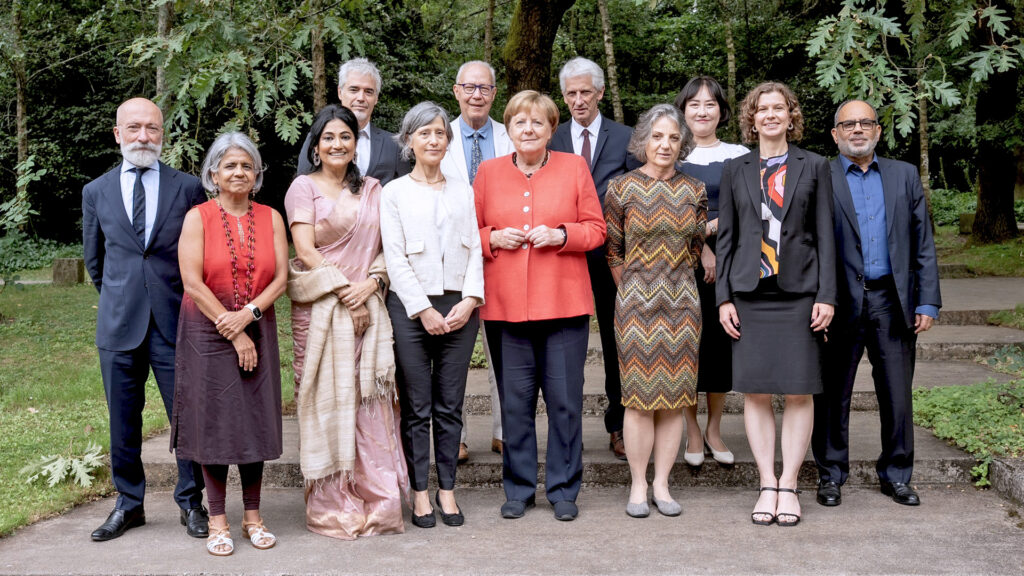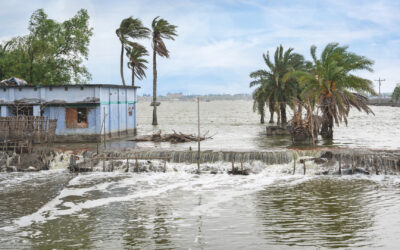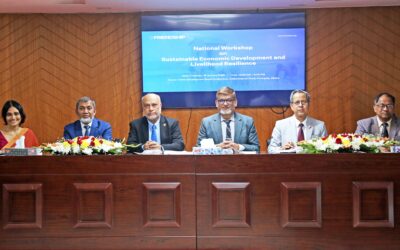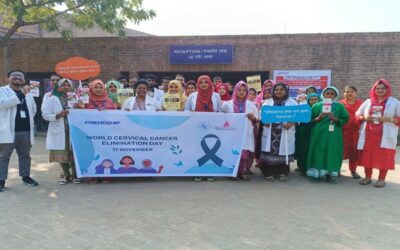Friendship founder Runa Khan joins the award ceremony as a committee member on 9 July in Lisbon, to celebrate champions with an impeccable track record of climate action.

On the front row from left to right: ASOC Senior Advisor Dr. Ricardo Roura, writer and environmentalist Sunita Narain (India), Friendship founder Runa Khan (Bangladesh), Angela Merkel (Germany), Professor Sandra Díaz (Argentina), and ASOC Executive Director Clair Christian.
On the back row from left to right: Miguel Bastos Araújo, Vice-President of the Gulbenkian Prize Jury (Portugal), ASOC Founder and Board Chair Jim Barnes, ASOC Coordinator Eunhee Kim (South Korea), and Carlos Lopes (South Africa), Chair of the Africa Climate Foundation. © Márcia Lessa, Fundação Calouste Gulbenkian
by Friendship News Desk
6 August 2025
The Gulbenkian Prize for Humanity recognises the work of individuals, groups, and organisations that have led the fight against climate change with scalable solutions and actions that inspire global change towards a more hopeful, sustainable future. This year, Runa Khan attended the award ceremony as a jury member and a member of the awards committee. Subsequently, she spoke on a panel session the next day, sharing lessons learned from the organisation that she founded in 2002, Friendship.
Since 2020, the Gulbenkian Foundation has been awarding EUR 1 million annually to winners from around the world. The winner is decided by an independent jury chaired by Angela Merkel, former Chancellor of Germany.
This Year’s Winner: Antarctic and Southern Ocean Coalition (ASOC)
The Antarctic and Southern Ocean Coalition (ASOC) has been awarded the Gulbenkian Prize for Humanity 2025 for its exceptional work in protecting Antarctica and the Southern Ocean, the last truly pristine wilderness. The coalition thrives on international collaboration, science-based advocacy, and environmental stewardship. Since 1978, it has united several environmental organisations across continents to defend the ecological integrity of this region. It is the only environmental NGO with observer status in the Antarctic Treaty System.
It successfully implemented activities related to ocean protection, preventing overexploitation, and enhancing global climate action, all under excellent leadership. The coalition is proof that cooperation, evidence-based work, and strong commitments can protect biodiversity and secure climate systems despite rapid polar change. A notable achievement includes the establishment of the Ross Sea Marine Protected Area.
Bold Collaborations and Shared Lessons: Runa Khan’s Address
In an hour-long panel titled ‘Bold Collaboration for a Shared Planet: Lessons from the Edge’, Runa Khan and her fellow panellists Clair Christian, ASOC Executive Director, Jim Barnes, ASOC founder, and Gulbenkian jury member Carlos Lopes discussed how diverse actors, including civil society, scientists, and policymakers, can collaborate to advance global climate goals.
Runa emphasised the importance of international coalitions understanding the human scale of climate displacement and connecting with vulnerable communities. Char dwellers relocate dozens of times due to erosion and flooding, but they do not wait to receive aid. They are survivors and problem-solvers. Any partnership will be truly effective if its agency is recognised by co-designing and co-creating solutions that heavily involve their active input. Collaborations should be grounded, not imposed top-down, stripping them of dignity and hope.
Often, NGOs and international coalitions are seen as more effective than the government, yet they receive very little support that could be effectively distributed to the local communities. Runa shared that true climate justice requires the redistribution of decision-making power. Only when communities are trusted and given space to lead is systemic change possible.
The Gulbenkian Prize fund supports initiatives aimed at transforming the lives of climate-vulnerable communities and promoting national and global climate action. By celebrating their efforts, the Foundation aims to foster the interconnected relationships between people, nature, and the planet, facilitating a transition away from fossil fuel dependence.



